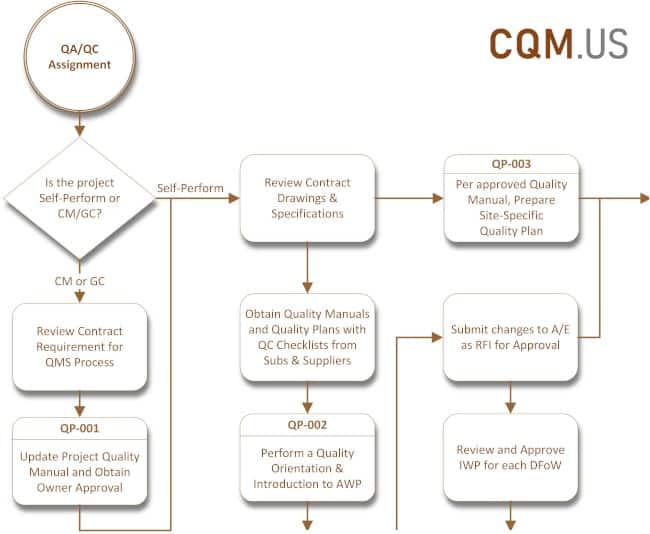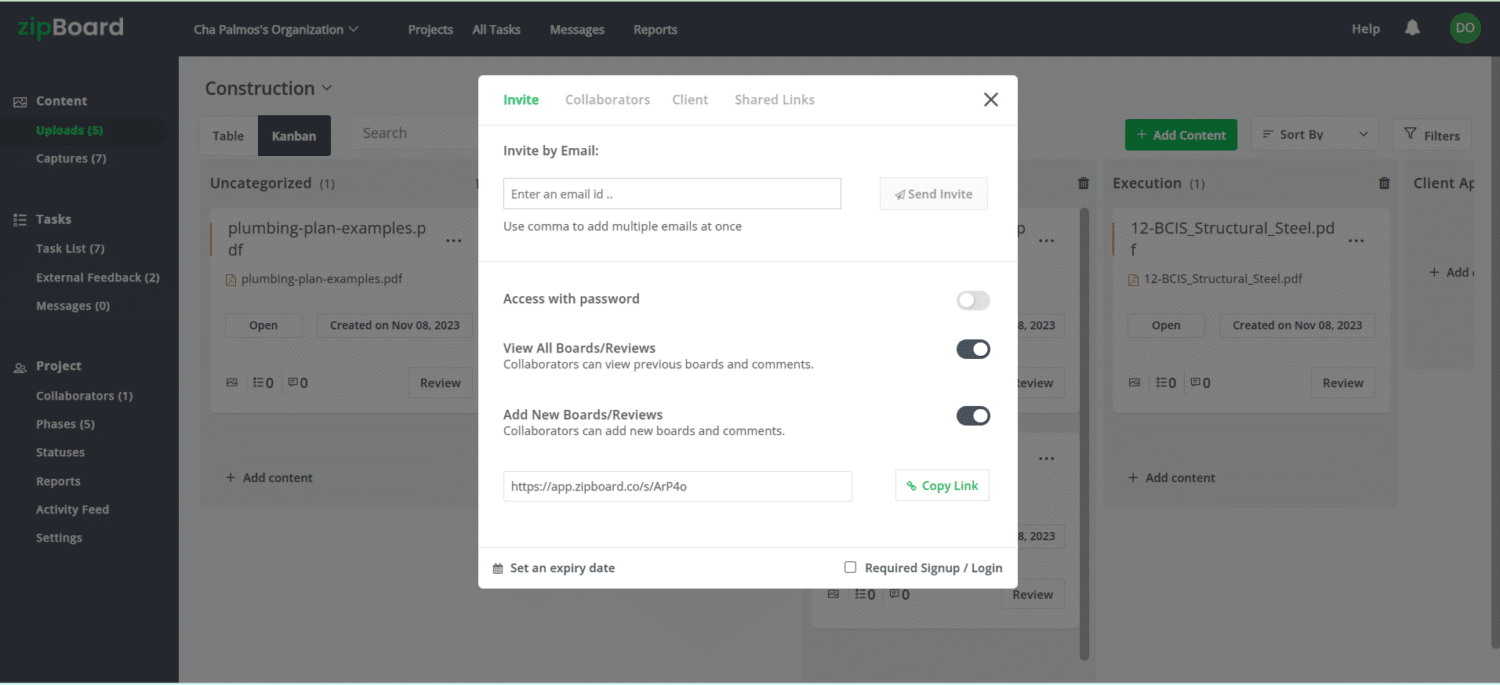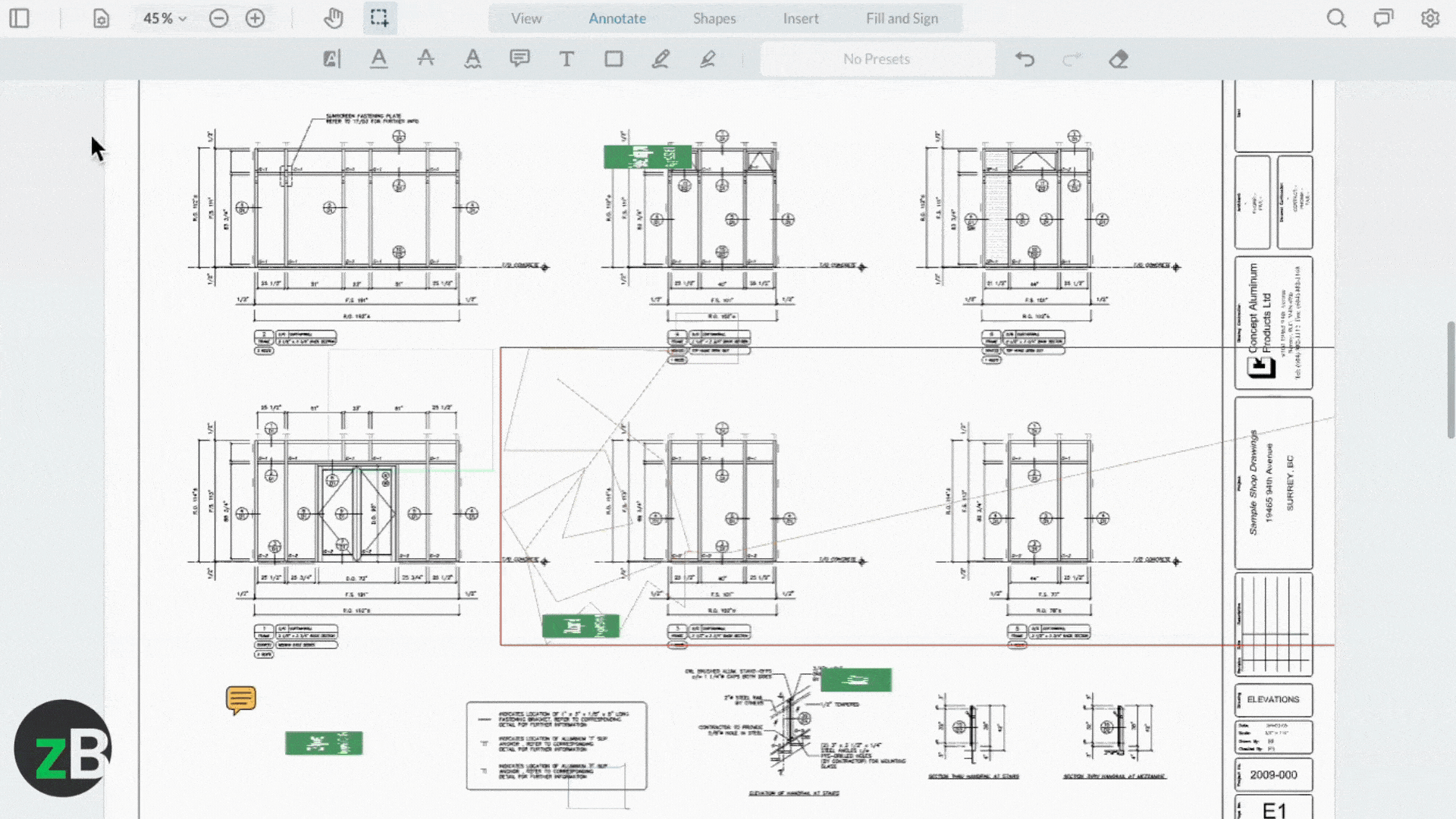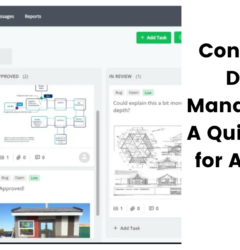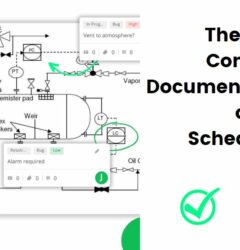The Role of Quality Assurance in Construction Document Reviews
27 Mar
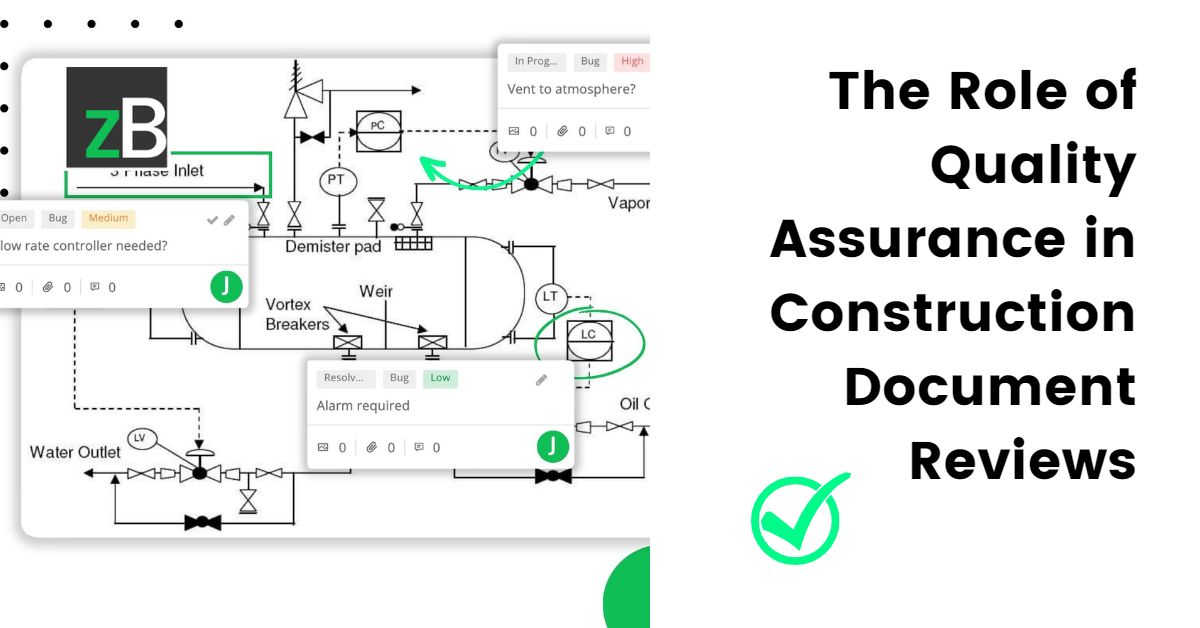
Table of Contents
ToggleQuality assurance in construction ensures that construction projects are in accordance with industry regulations and standards. It also ensures that the final product meets the owner’s requirements and expectations, is safe for use, and performs as intended.
QA (quality assurance) differs from QC (quality control) in that QA deals with the processes of ensuring the project meets the required standards, thereby preventing risks and errors. On the other hand, QC deals with inspecting the outcome (product) after construction to ensure that there are no defects – and if there are any, QC helps correct them. This article only focuses on QA.
💡 Pro-tip: Don’t just treat construction quality assurance as a box to tick — especially during construction document reviews. Instead, intentionally outline and execute QA best practices.
When done right, you will save costs and avoid or mitigate construction risks. This also improves communication and enhances the overall quality of the project documentation.
Quality is never an accident. Quality is always the result of high intentions, sincere efforts, intelligent direction, and skillful execution.
Jayant Sheth, Specialist ENGINEER and contractor FOR thirty-five years - QUORA
What is Quality Assurance in Construction Document Reviews?
QA in construction document reviews refers to the process of reviewing construction documents to ensure that they meet the owner’s requirements, are accurate, complete, and in compliance with industry regulations, codes, and standards.
The stakeholders involved in the construction QA process for project documentation include:
- Project owners
- Architects
- Engineers
- General Contractors & Subcontractors
- Construction Inspectors
- Regulatory Agencies
- Third-Party Quality Assurance Firms
It’s worth noting that Construction QA managers, whether part of a QA firm or an internal team, play a critical role in ensuring the success of construction document reviews. Their responsibilities include:
- Developing and Implementing QA Policies: They establish and enforce construction quality assurance policies and procedures for document reviews.
- Conducting Audits: They perform regular audits to ensure all construction documents comply with required standards and regulations.
- Ensuring Document Accuracy: Construction QA managers collaborate with project managers, architects, and stakeholders to verify that all documents are accurate, complete, and meet quality standards.
- Facilitating Stakeholder Involvement: They ensure all stakeholders are actively involved in the document review process and understand their roles and responsibilities.
- Providing Access to Resources: QA managers supply stakeholders with the necessary software, training, and documentation to perform their roles effectively.
[Free eBook]
Construction Document Reviews
Discover how to optimize construction document reviews with the right tools and resources. From efficient document management software to streamlined collaboration methods, we'll guide you through the process.
Streamline Your Construction QA Process with zipBoard
zipBoard is a centralized platform for managing construction document reviews and quality assurance workflows.
Book DemoStart Free TrialQA Components in Construction Document Reviews
The components of quality assurance in construction document reviews are the various aspects that make a complete QA process.
Document Control
Document control in construction QA involves establishing document standards, templates, and procedures. It also deals with ensuring that the appropriate stakeholders properly review, approve, and maintain the documents.
Effective document control ensures that project stakeholders have access to the right information at the right time and that the documentation is accurate, complete, and up-to-date.
Document Review and Approval Process
The document review process allows the QA team and other stakeholders to review the project documentation to ensure accuracy, completeness, and compliance with regulatory requirements and project specifications.
The document approval process, on the other hand, ensures that project documentation is authorized by the appropriate parties before any decision is made to proceed to the next phase of the construction project.
[Webinar]
Simplify Your Construction Review Process
Learn how to structure a construction document review/approval process that facilitates better feedback, speeds up turnaround time by 50%, and results in greater end quality.
Watch on-demand - for free!Document Version Control
Document versioning is the process of managing multiple versions of a document to ensure that the latest version is always used in order to minimize or avoid construction document errors and omissions.
This component of the QA process involves tracking changes made to the document, assigning unique identifiers to each version, and ensuring that the latest version is easily accessible to all stakeholders.
Learn more about zipBoard’s document version control software
Simplify Stakeholder Collaboration with zipBoard
Assign roles, track document versions, and collect feedback in one place.
Book DemoStart Free TrialDocument Storage and Retrieval
This involves establishing a system for organizing, storing, and retrieving project documentation in a way that is secure, efficient, and easily accessible.
Effective document storage and retrieval ensure that stakeholders can quickly access the information they need, and that project documentation is protected from loss, damage, or unauthorized access.
Benefits of Quality Assurance in Construction Document Reviews
Construction QA in document reviews goes a long way to ensure the project meets industry standards and the owner’s expectations. Here are 5 benefits of effective quality assurance in construction:
Ensures compliance with regulations and standards
An effective and successful QA process fosters compliance with industry standards and rules and this helps reduce the risk of legal or regulatory issues – including environmental and sustainability standards.
Reduces the risk of errors and omissions
Effective document control and version control ensure that project documentation is accurate and up-to-date, reducing the risk of rework and change orders, which can help reduce project costs. This not only improves the overall quality of the project but also helps reduce the risk of errors that could lead to safety issues.
Improves stakeholder communication and collaboration
A successful QA improves communication and collaboration among project stakeholders by ensuring that everyone has access to the same information and each stakeholder understands their roles and responsibilities. This leads to better decision-making, reduces the risk of misunderstandings, and improves project outcomes.
Provides a structured approach to document reviews
QA provides a structured approach to document reviews and this ensures consistency and standardization across all documents. This is important in large projects where multiple stakeholders are involved, and numerous documents need to be reviewed.
By providing a standardized approach, QA ensures that all documents are reviewed consistently and that nothing is missed.
[Webinar]
Streamline Your Construction Review Process
Learn how to structure a construction document review/approval process that facilitates better feedback, speeds up turnaround time by 50%, and results in greater end quality.
Watch on-demand - for free!Facilitates efficient project management and decision-making
Quality assurance in construction helps to identify potential risks and issues early in the project lifecycle, enabling project teams to take appropriate action to mitigate or eliminate these risks.
Consequently, this reduces the likelihood of project delays, cost overruns, and other issues, and facilitates efficient project management and decision-making.
Ready to Improve your QA Process?
Use zipBoard to standardize your document reviews and streamline collaboration.
Book DemoStart Free TrialHow to Implement Construction Quality Assurance in Project Documentation
Establish clear documentation standards and guidelines
Have clear documentation standards and guidelines that specify how project documentation should be created, reviewed, and approved. These standards should include details such as document format, naming conventions, and revision history.
Use an Inspection and Test Plan
An ITP is a quality assurance document – an inspection checklist – that includes specific tests and inspections that need to be performed during the construction document review process, as well as the criteria for acceptance or rejection of the work.
An inspection and test plan ensures that all items on the list are checked at the appropriate stages of the construction document review process.
The contractor usually prepares the ITP and the client or project owner reviews and approves it to ensure that all quality standards are met.
Develop a QA review process
A streamlined QA review process in construction documentation ensures that the construction document review is accurate and complies with regulatory standards and project specifications.
A QA process should include clear roles and responsibilities for document design, review, and approval.
Establish document version control procedures
Establish document version control procedures by tracking changes to documents, maintaining a version history, and controlling access to previous versions.
Document version control procedures ensure that project documentation is accurate and up-to-date and that all stakeholders have access to the latest version of each document.
Use a QA review tool and document management software to streamline the process
A centralized construction QA review and document approval software integrated with document management software can help streamline QA in construction document reviews.
A construction document review and approval tool like zipBoard will enable reviewers to leave contextualized feedback on the documents using PDF annotation tools.
This ensures clarity in the review process and prevents long email threads, setting up share screen calls, and using spreadsheets to manage QA reviews.
Moreso, document management software will help optimize your document storage and retrieval, making it easier for project stakeholders to access and share project documentation.
The good thing about zipBoard is that it integrates seamlessly with document management software, ERP systems – so you can review documents, ensure version control, and manage construction documents all in one place.
Simplify your Construction QA Reviews with zipBoard
Annotate PDFs, manage tasks, and track document versions, all in one place.
Book DemoStart Free TrialQA Challenges in Construction Document Reviews
Difficulty in maintaining document version control
This occurs when multiple stakeholders create and update project documentation. It can also happen when you use document management software that does not ensure version control.
Solution: Outline and document clear document control procedures. You can do this by defining roles and responsibilities for document design, review, and approval.
Additionally, use a centralized document review and approval software that can integrate seamlessly with your document management software. This will help the entire review team stay up to date on the latest document.
A typical example is zipBoard – a document review and approval software for AEC teams.
Time constraints on document review and approval
The QA process in construction document reviews can be time-consuming. Owing to this, you may miss project deadlines if you do not have a schedule.
For instance, on average, it can take about 28 days to review construction submittals, but some people also take as long as 42 days. These may all depend on the type of project but you do not want to be the person missing deadlines.
Solution: Establish clear deadlines for document review and approval by creating a schedule for the construction document QA process.
Note that the timelines for every construction project will differ depending on the scope of the project, so you cannot have one timeline for every construction project.
Also, use a document review and approval tool (like zipBoard) and Autodesk Docs, as well as document management software (like PlanGrid or Bluebeam) to help streamline the review and approval process.
Difficulty in managing large volumes of project documentation
Construction projects generate a large volume of documentation, which can be challenging to manage and store effectively.
Solution: Invest in document management software like Procore, Bluebeam Revu, PlanGrid, Autodesk BIM 360, and zipBoard, as they provide a centralized location for all project documentation.
If your stakeholders are not familiar with this software, get in touch with the service providers to provide training or a personalized demo for your team.
Simplify Quality Assurance in Construction Document Reviews with zipBoard
Start your free trial or book a demo today so that we can create a tailored solution for you.
Book DemoStart Free TrialWhat Next?
With a good understanding of the role of QA in construction document reviews and the appropriate steps and resources needed to ensure project quality, you’re now ready to plan, implement, and execute a QA process for your ongoing or upcoming construction document QA process.
FAQs
Quality assurance (QA) in building construction involves systematic processes to ensure that construction activities meet predefined quality standards. It focuses on preventing defects through proper planning, documentation, and process control, ensuring that materials, workmanship, and procedures comply with regulatory and project requirements.
- Quality Assurance (QA): A proactive process aimed at preventing errors by establishing standards, procedures, and systematic reviews throughout the construction project.
- Quality Control (QC): A reactive process focused on identifying and correcting defects through inspections, testing, and verification after work is completed.
To achieve effective QA in construction, teams should:
- Develop and implement a detailed QA plan.
- Use collaborative tools like zipBoard for streamlined document reviews.
- Conduct regular audits and inspections.
- Train staff on quality standards and procedures.
- Engage all stakeholders in the QA process for transparency and accountability.
Quality assurance helps prevent costly errors, reduces rework, improves safety, and ensures compliance with regulations. It leads to higher client satisfaction, timely project completion, and better resource management.
zipBoard simplifies construction QA by offering:
- Punch Listing & Defect Tracking: Identify, assign, and track issues in real time.
- Version Control: Manage document versions to avoid confusion and errors.
- Collaborative Reviews: Enable stakeholders to provide feedback directly on documents.
- Task Management: Convert feedback into actionable tasks to streamline workflows.
- Cloud-Based Access: Centralized access to project documents and reviews for all team members.
Author’s bio:
Dorcas Kpabitey is a Content Marketing Specialist at zipBoard. She began her content marketing journey alongside her BA in Political Science and Spanish at the University of Ghana. If she is not tapping away at her keyboard or spending time on Twitter and LinkedIn, she spends her day reading articles, newsletters and books.
Recent Posts
- User-Friendly E-Learning Review Tools: Trends for Teams in 2026 February 20, 2026
- Your Digital Asset Review Workflow Is Broken (And How to Fix It) February 3, 2026
- Best Practices for Efficient Document Reviews and Collaboration December 18, 2025
- MEP Document Management: How to Streamline Reviews & Avoid Rework October 3, 2025
- What Is Online Proofing Software? And Why Content Review Breaks Without It July 11, 2025
©️ Copyright 2025 zipBoard Tech. All rights reserved.
